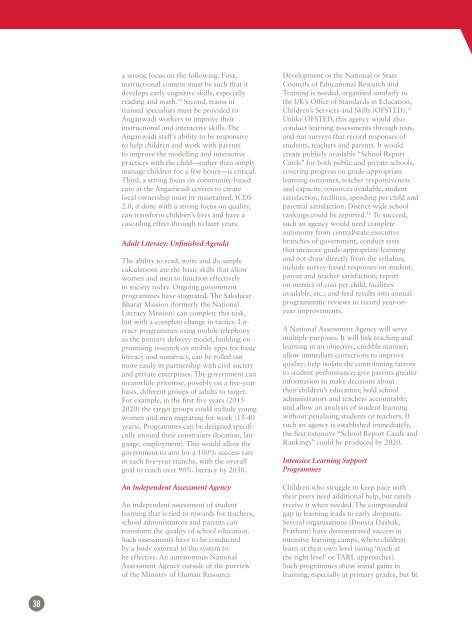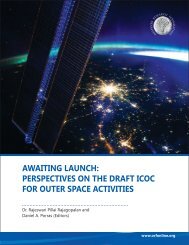Mathur Ritika Passi
zVAWsQ
zVAWsQ
You also want an ePaper? Increase the reach of your titles
YUMPU automatically turns print PDFs into web optimized ePapers that Google loves.
a strong focus on the following. First,<br />
instructional content must be such that it<br />
develops early cognitive skills, especially<br />
reading and math. 14 Second, teams of<br />
trained specialists must be provided to<br />
Anganwadi workers to improve their<br />
instructional and interactive skills. The<br />
Anganwadi staff’s ability to be responsive<br />
to help children and work with parents<br />
to improve the modelling and interactive<br />
practices with the child—rather than simply<br />
manage children for a few hours—is critical.<br />
Third, a strong focus on community-based<br />
care at the Anganwadi centres to create<br />
local ownership must be maintained. ICDS<br />
2.0, if done with a strong focus on quality,<br />
can transform children’s lives and have a<br />
cascading effect through to later years.<br />
Adult Literacy: Unfinished Agenda<br />
The ability to read, write and do simple<br />
calculations are the basic skills that allow<br />
women and men to function effectively<br />
in society today. Ongoing government<br />
programmes have stagnated. The Sakshaar<br />
Bharat Mission (formerly the National<br />
Literacy Mission) can complete this task,<br />
but with a complete change in tactics. Literacy<br />
programmes using mobile telephony<br />
as the primary delivery model, building on<br />
promising research on mobile apps for basic<br />
literacy and numeracy, can be rolled out<br />
more easily in partnership with civil society<br />
and private enterprises. The government can<br />
meanwhile prioritise, possibly on a five-year<br />
basis, different groups of adults to target.<br />
For example, in the first five years (2015-<br />
2020) the target groups could include young<br />
women and men migrating for work (15-40<br />
years). Programmes can be designed specifically<br />
around their constraints (location, language,<br />
employment). This would allow the<br />
government to aim for a 100% success rate<br />
in each five-year tranche, with the overall<br />
goal to reach over 90% literacy by 2030.<br />
An Independent Assessment Agency<br />
An independent assessment of student<br />
learning that is tied to rewards for teachers,<br />
school administrators and parents can<br />
transform the quality of school education.<br />
Such assessments have to be conducted<br />
by a body external to the system to<br />
be effective. An autonomous National<br />
Assessment Agency outside of the purview<br />
of the Ministry of Human Resource<br />
Development or the National or State<br />
Councils of Educational Research and<br />
Training is needed, organised similarly to<br />
the UK’s Office of Standards in Education,<br />
Children’s Services and Skills (OFSTED). 15<br />
Unlike OFSTED, this agency would also<br />
conduct learning assessments through tests,<br />
and run surveys that record responses of<br />
students, teachers and parents. It would<br />
create publicly available “School Report<br />
Cards” for both public and private schools,<br />
covering progress on grade-appropriate<br />
learning outcomes, teacher responsiveness<br />
and capacity, resources available, student<br />
satisfaction, facilities, spending per child and<br />
parental satisfaction. District-wide school<br />
rankings could be reported. 16 To succeed,<br />
such an agency would need complete<br />
autonomy from central/state executive<br />
branches of government; conduct tests<br />
that measure grade-appropriate learning<br />
and not draw directly from the syllabus;<br />
include survey-based responses on student,<br />
parent and teacher satisfaction; report<br />
on metrics of cost per child, facilities<br />
available, etc.; and feed results into annual<br />
programmatic reviews to record year-onyear<br />
improvements.<br />
A National Assessment Agency will serve<br />
multiple purposes. It will link teaching and<br />
learning in an objective, credible manner;<br />
allow immediate corrections to improve<br />
quality; help isolate the contributing factors<br />
to student performance; give parents greater<br />
information to make decisions about<br />
their children’s education; hold school<br />
administrators and teachers accountable;<br />
and allow an analysis of student learning<br />
without penalising students or teachers. If<br />
such an agency is established immediately,<br />
the first extensive “School Report Cards and<br />
Rankings” could be produced by 2020.<br />
Intensive Learning Support<br />
Programmes<br />
Children who struggle to keep pace with<br />
their peers need additional help, but rarely<br />
receive it when needed. The compounded<br />
gap in learning leads to early dropouts.<br />
Several organisations (Doosra Dashak,<br />
Pratham) have demonstrated success in<br />
intensive learning camps, where children<br />
learn at their own level (using ‘teach at<br />
the right level’ or TARL approaches).<br />
Such programmes show initial gains in<br />
learning, especially at primary grades, but fit<br />
38








